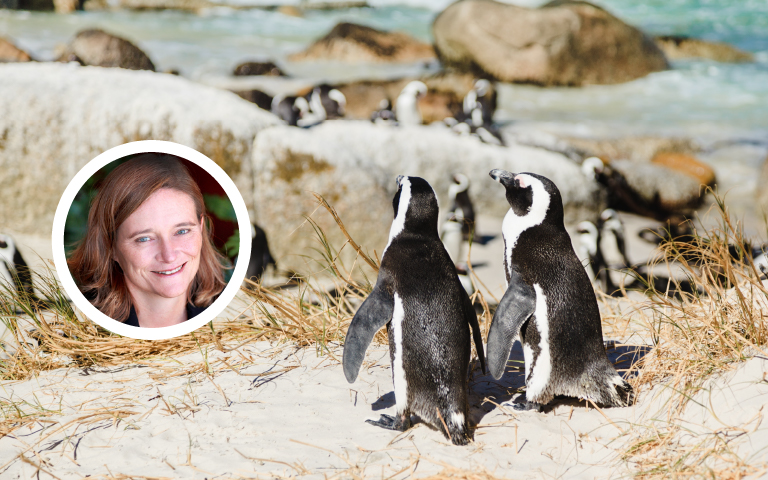 There’s no way around the facts, at their current rate of decline, African penguins are going to be functionally extinct in the wild within 20 years. By 2035, some colonies which have thrived on the South African coastline for hundreds of years will be no more. Without immediate action, a future without African penguins in the wild is certain. We can prevent this – we can say #NotOnOurWatch.
There’s no way around the facts, at their current rate of decline, African penguins are going to be functionally extinct in the wild within 20 years. By 2035, some colonies which have thrived on the South African coastline for hundreds of years will be no more. Without immediate action, a future without African penguins in the wild is certain. We can prevent this – we can say #NotOnOurWatch.
- 100 years ago, there were between 1.5 and 3 million African penguins on the South African and Namibian coasts.
- Single colonies alone, like Dassen Island, were once home to about a million breeding pairs of African penguins.
- Today, there are fewer than 10 400 breeding pairs left in the wild. That number is steadily decreasing.
To put that in perspective, if you gave every remaining wild African penguin in South Africa a seat at the Cape Town Stadium, it would only be a third full. If we still had the population of penguins we did in 1900, we could fill every single stadium seat in the whole of South Africa with a penguin!
But there is hope. Together our voice as consumers and voters has the power to influence the policies and economic decisions that can save the African penguin – if action is taken now. We have the power to choose sustainable seafood, we can ask retailers about the animal feeds used to farm heir stocked meat products and we can influence ourlocal decision-makers to give African penguins the highest protection South Africans can offer. There’s no good reason for African penguins to go extinct. #NotOnOurWatch.
What is “functional extinction”?
To support a population, there needs to be a large enough number of penguins to support genetic diversity, provide resilience to natural disasters, and allow for reproductive replacement. Functional extinction means is that if there are too few penguins, then they won’t be able to find mates to prevent dwindling numbers, they won’t have the genetic resilience to overcome diseases or to adapt to a changing environment, and they will not be able to overcome even the smallest of damage to their colonies.
Basically, the few penguins that remain at this point will not be able to rebuild their species. It will be a downward spiral, first individual colonies will disappear, and eventually, the few “strong” colonies will fail too, until there are no penguins left.
What is the value of the African penguin?
African penguins are important. They are an indicator species, a sentinel of the health of our ocean ecosystems. The health of African penguin colonies is a direct reflection of the health of their habitat, and the declining populations of penguin colonies that we see today is a strong indication that the health of parts of the marine ecosystem that we cannot easily see is in decline as well. Penguins are also known to directly contribute to the ocean’s nutrient cycle, and their hunting activities are also known to encourage the grouping of smaller prey animals, making them more accessible to other seabirds. In other words, the decline of the African penguin tells us that parts of the ecosystem that we humans need too, like commercially important fish stocks, are also in trouble in these areas.
These penguins also have a tangible economic value to humans too. Almost a third of visitors to Cape Town listed visiting Boulders Beach as one of their reasons for visiting the Cape. This single colony generated a turnover of over R300 million in 2018 in associated offerings, and benefitted a further 48 local businesses – creating at least 885 jobs. African penguins are a cornerstone of South African tourism, and their loss will result in a permanent detriment to the coastal communities that rely on tourism to boost their local economy.
What can you do:
Our African penguins need your help. Since 1979, when the first full count of the major South African colonies was conducted, the breeding population has declined from ~55 200 pairs to ~10 000 breeding pairs in 2022. We have lost over 90% of the African penguin population, in that time.
The ONLY way to save African penguins is to act with urgency – we need to communicate to the government and other stakeholders that have the ability to influence policy that immediate, effective action is the only way forward. We need to stand up and say #NotOnOurWatch!
The Department of Forestry, Fisheries and the Environment recently gazetted a proposed update to the African Penguin Biodiversity Management Plan – which does contain a number of actions that could effectively help the dwindling African penguin problem, but unfortunately, there are few timelines and definitive action plans within this document. Action is needed. Note: Recently announced fishing closures around some penguin colonies are not expected to make a meaningful impact, due to poor timing and a lack of conservationist consultation.
So, you need to be the voice of the African penguin. You need to let the decision-makers know that this is an issue that you as a voter and consumer care about, and a priority that is important to you. You need to say that you won’t let the African penguin go extinct, #NotOnOurWatch.
Here are the outcomes that can save the African penguin – and which we believe public support can achieve:
- African penguins being granted the highest conservation status and protections under South African law.
- Firm commitments from the government, with clear deadlines for the implementation of actions noted in the Biodiversity Management Plan for the African penguin.
- Government assurance that protections granted to African penguins will ensure readily available food access throughout their lives.
- Businesses being accountable for their role in the overconsumption of ocean resources, and making efforts to change to and support alternative, but readily available alternative technologies, and economic activities. Eg. Shifting livestock from fishmeal to alternatives, increasing the value of anchovy as a human food rather than fishmeal, etc.
- Celebration of the African penguin as an iconic aspect of the South African spirit, and a vital asset to our economy through tourism.









